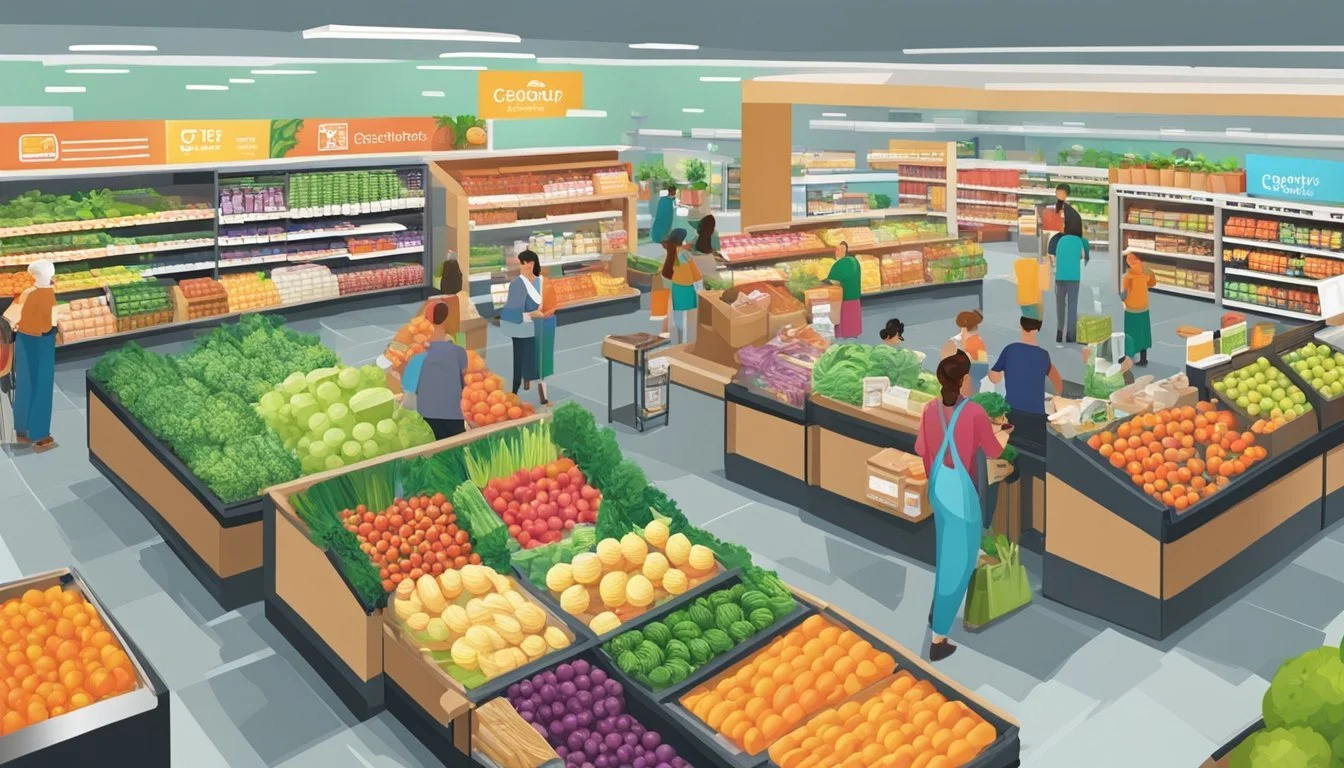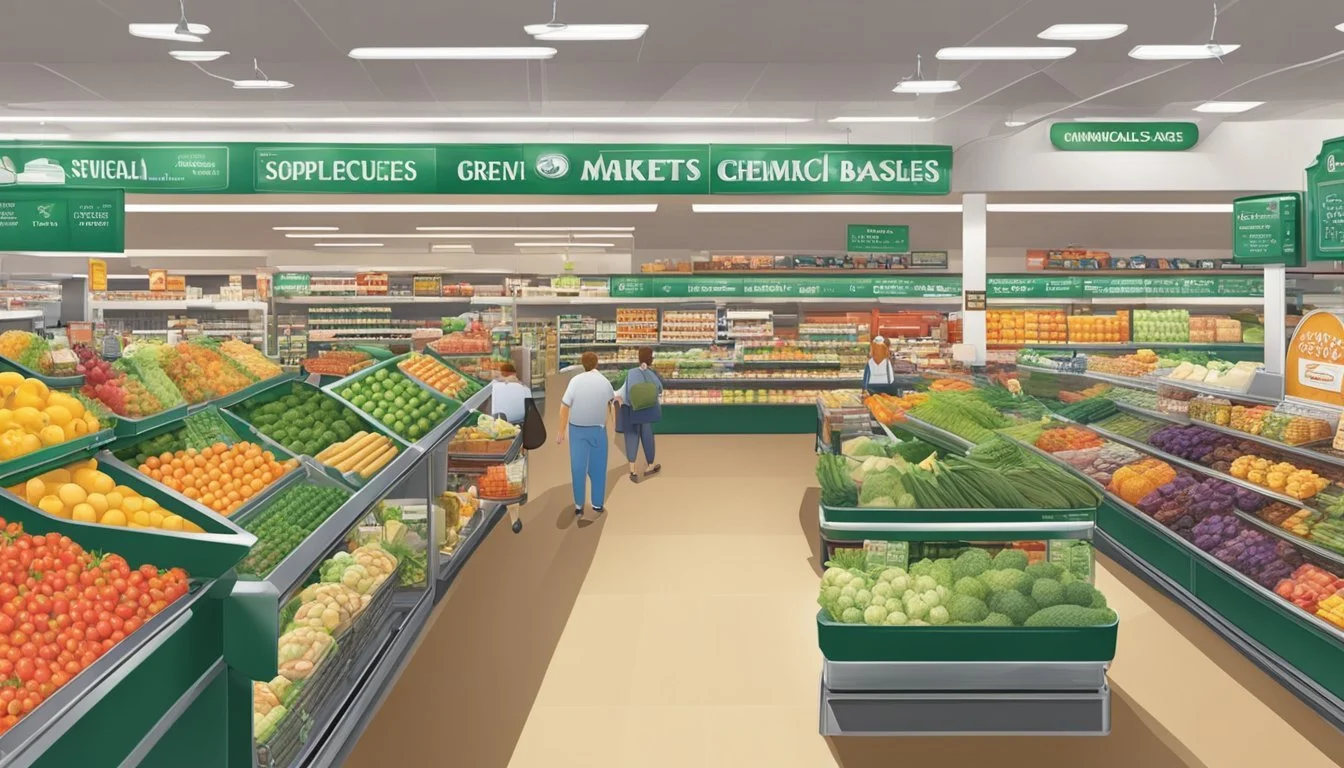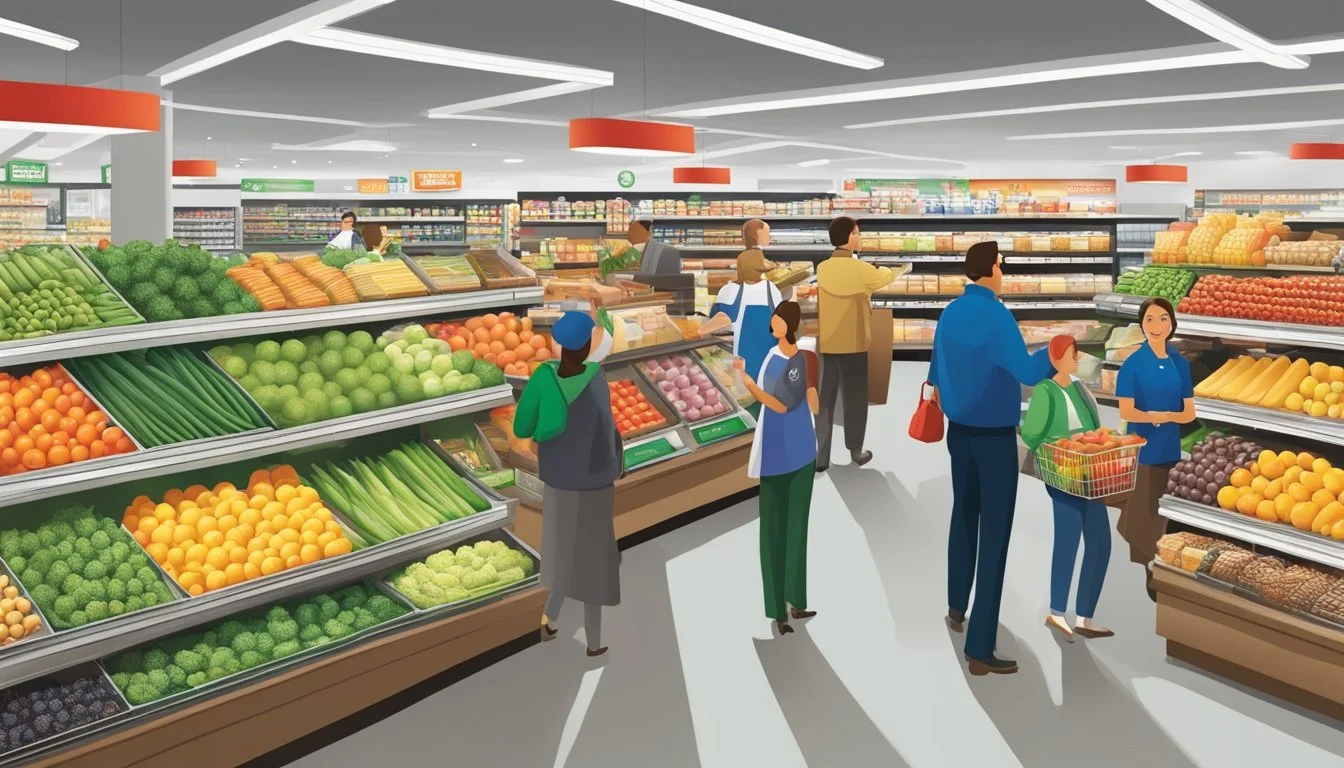Demoulas Market Basket vs Ingles Markets
Comparing Prices, Selection, and Customer Experience
Demoulas Market Basket and Ingles Markets are two prominent grocery store chains in the United States, each with a unique history and customer base. Market Basket, founded in 1917 by Greek immigrants in Lowell, Massachusetts, has grown to operate 88 stores across New England. Ingles Markets, established in 1963, serves customers primarily in the southeastern United States.
Both supermarket chains have built loyal followings in their respective regions. Market Basket is known for its low prices, employee loyalty, and strong community ties, while Ingles Markets is recognized for its fresh produce and in-store pharmacies. The choice between the two often depends on location and personal preferences.
Customers value different aspects of their grocery shopping experience, from product selection and pricing to customer service and store atmosphere. Market Basket's dramatic 2014 employee protests demonstrated the deep connection between the company and its workers, while Ingles Markets has focused on expanding its offerings to meet changing consumer demands.
Company Histories and Market Presence
Demoulas Market Basket and Ingles Markets both have deep roots in their respective regions, growing from small family businesses into significant grocery chains over several decades.
Demoulas Market Basket: Origins and Expansion
Demoulas Market Basket traces its origins to 1917 in Lowell, Massachusetts. Greek immigrants Athanasios and Efrosini Demoulas opened a small grocery store specializing in fresh lamb.
The business thrived despite the Great Depression. In 1954, sons Telemachus and George Demoulas incorporated DeMoulas Super Markets, expanding rapidly across New England.
By 2024, Market Basket operates 88 stores in Massachusetts, New Hampshire, Maine, and Rhode Island. The company's headquarters are in Tewksbury, Massachusetts.
Market Basket is known for its low prices and employee loyalty. In 2014, the chain faced a major crisis when employees protested leadership changes, temporarily shutting down operations.
Ingles Markets: Establishment and Growth
Robert Ingle founded Ingles Markets in 1963 in Asheville, North Carolina. The company started with a single store and expanded throughout the southeastern United States.
Ingles focused on suburban and rural communities, often becoming a primary shopping destination in smaller towns.
The chain grew steadily, going public in 1987. By 2024, Ingles operates over 200 supermarkets across six southeastern states.
Ingles Markets is known for its in-store bakeries, delis, and pharmacies. The company also owns and operates its distribution center and dairy processing facility.
Corporate Structure and Leadership
Demoulas Market Basket and Ingles Markets have distinct ownership structures and leadership approaches that have shaped their corporate cultures. Both companies have faced family-related challenges in their governance.
Governance and Ownership Dynamics
Demoulas Market Basket operates as a privately held company controlled by the Demoulas family. The chain endured a lengthy ownership dispute between cousins Arthur T. and Arthur S. Demoulas. This conflict culminated in 2014 when Arthur T. was ousted as CEO, leading to widespread employee protests.
Arthur T. Demoulas ultimately regained control, purchasing the company for $1.5 billion. Since then, he has maintained majority ownership and serves as CEO. The company's board of directors includes family members and outside professionals.
Ingles Markets, in contrast, is a publicly traded company on the NASDAQ. The Ingle family maintains significant control through ownership of Class B shares with enhanced voting rights. Robert P. Ingle II, son of the founder, holds the positions of Chairman and CEO.
Leadership Profiles
Arthur T. Demoulas is known for his employee-centric management style at Market Basket. He champions profit-sharing programs and competitive wages. His leadership approach emphasizes personal connections with staff and customers.
Market Basket's executive team includes long-serving employees who rose through the ranks. This promotes continuity in the company's culture and operations.
Robert P. Ingle II leads Ingles Markets with a focus on regional expansion and store modernization. The company's board includes both Ingle family members and independent directors, providing a mix of insider knowledge and external perspectives.
Ingles' leadership team combines family representation with experienced retail executives. This structure aims to balance family values with professional management practices.
Financial Overview
Demoulas Market Basket and Ingles Markets show distinct financial profiles, with differences in revenue, profitability, and pricing strategies. Both companies have navigated challenging economic conditions while maintaining their market positions.
Revenue and Profit Analysis
Ingles Markets reported net sales of $5.68 billion in fiscal year 2022, up from $4.99 billion in 2021. This 13.8% increase demonstrates strong growth for the regional grocery chain. Ingles' third quarter 2022 sales reached $1.46 billion, a 14.1% jump from the previous year.
Market Basket's exact financials are not publicly available as a private company. However, industry estimates place their annual revenue in the billions. The company's 2014 ownership dispute and subsequent $1.5 billion buyout by Arthur T. Demoulas highlighted its significant value.
Both chains have maintained profitability despite inflation pressures. Ingles Markets trades publicly, offering dividends to shareholders. Market Basket's private status allows for more flexible financial management.
Pricing Strategies and Customer Value
Market Basket is renowned for its low prices, a key pillar of its business model. The company focuses on high-volume sales with slim margins to deliver value to customers. This strategy has cultivated a loyal customer base, even during periods of economic uncertainty.
Ingles Markets adopts a balanced approach to pricing. While not as aggressive as Market Basket, Ingles offers competitive prices alongside a wider product selection. The company leverages its own manufacturing facilities to control costs and maintain margins.
Both chains emphasize customer value beyond just low prices. Market Basket's employee profit-sharing program indirectly benefits customers through motivated staff. Ingles invests in store renovations and fuel centers to enhance the shopping experience.
Store Operations and Customer Experience
Demoulas Market Basket and Ingles Markets have distinct approaches to store operations and customer experience. These differences are evident in their product offerings, technological implementations, and employee management practices.
Product Selection and Quality
Market Basket focuses on providing a wide range of products at competitive prices. Their produce section is known for its freshness and variety. The deli department offers an array of prepared foods and custom-cut meats. Market Basket's dairy selection includes both national brands and local options.
Ingles Markets emphasizes its fresh departments, particularly meat and produce. They often feature locally sourced items and offer a broad selection of organic products. The supermarket chain is noted for its in-store bakeries and extensive wine departments.
Both chains prioritize quality in their fresh lamb offerings, catering to diverse customer preferences.
In-Store Technology and Checkout Process
Market Basket has been slower to adopt new technologies, maintaining a more traditional approach to checkout. They primarily rely on cashier-operated registers, with limited self-checkout options in some locations.
Ingles Markets has invested more heavily in technology. Many of their stores feature self-checkout kiosks, allowing customers to process their own transactions. Ingles also offers mobile apps for digital coupons and shopping lists.
Both chains accept various payment methods, including consumer credit cards. However, Ingles tends to provide more tech-driven conveniences throughout the shopping experience.
Employee Relations and Store Management
Market Basket is renowned for its employee-centric culture. The company offers competitive wages and benefits, fostering strong employee loyalty. This approach has resulted in low turnover rates and experienced staff members who often provide excellent customer service.
Ingles Markets also values its employees, offering career advancement opportunities and benefits packages. The company maintains a more traditional management structure, with clear hierarchies in store operations.
Neither chain is unionized, but both emphasize internal promotion and long-term employee retention. This focus on employee satisfaction often translates to positive customer experiences in both Market Basket and Ingles stores.
Brand Perception and Marketing
Market Basket and Ingles Markets have distinct approaches to brand perception and marketing. Their strategies impact customer loyalty and public image in different ways.
Social Media and Online Presence
Market Basket maintains a relatively low-key social media presence. The company's Facebook page shares weekly specials and occasional company news. Their website is functional but basic, focusing on store locations and weekly flyers. This understated approach aligns with their no-frills, value-oriented image.
Ingles Markets has a more active social media strategy. They engage customers on Facebook, Twitter, and Instagram with recipes, promotions, and community events. Their website offers online shopping options and a loyalty program, catering to tech-savvy shoppers.
Advertising and Public Relations
Market Basket relies heavily on word-of-mouth marketing and customer loyalty. The company gained significant publicity during the 2014 employee protests and customer boycott, which demonstrated strong community support. This event reinforced their image as a company that values employees and customers over profits.
Ingles Markets takes a more traditional approach to advertising. They use local TV and radio spots, print ads, and digital marketing to promote their products and services. The company sponsors community events and supports local charities, building goodwill in their operating areas.
Both chains emphasize their commitment to the American Dream, but Market Basket's dramatic 2014 protests created a unique narrative around this theme.
Comparative Analysis
Market Basket and Ingles Markets have distinct approaches to grocery retail, impacting their customers, employees, and communities in different ways. Their business models and practices reveal key differences in pricing, product selection, and corporate culture.
Market Basket Vs. Ingles Markets
Market Basket, based in Lowell, Massachusetts, operates 88 stores across New England. The chain is known for its low prices and no-frills approach. Its stores focus on essential grocery items and offer fewer specialty products.
Ingles Markets, headquartered in Black Mountain, North Carolina, has over 200 stores in six southeastern states. The company provides a wider range of products, including organic and gourmet options. Ingles often features in-store pharmacies and fuel centers.
Market Basket's ownership structure is family-based, while Ingles Markets is publicly traded. This difference influences their decision-making processes and corporate strategies.
Customer Satisfaction and Retention
Market Basket has cultivated strong customer loyalty through its consistent low pricing and employee-centric culture. The chain's dedication to affordability was highlighted in a 2022 study by Dunnhuby, which ranked Market Basket as the top grocery store for handling inflation.
Ingles Markets focuses on providing a more diverse shopping experience. The company emphasizes fresh produce, local products, and personalized customer service to maintain customer satisfaction.
Both chains prioritize customer retention, but Market Basket's approach centers on price leadership, while Ingles Markets aims to offer a broader shopping experience.
Impact on Local and Regional Communities
Market Basket's influence on its communities was dramatically illustrated during the 2014 employee protests. The chain's importance to local economies became evident when the nine-week protest led to $583 million in lost sales and affected numerous vendors.
Ingles Markets contributes to local communities through its focus on regional products and partnerships with local suppliers. The company's larger stores often serve as anchor tenants in shopping centers, supporting other local businesses.
Both chains provide significant employment opportunities in their regions. Market Basket is known for its long-tenured employees and internal promotion practices, fostering strong community ties.
Legal and Ethical Considerations
Legal disputes and ethical practices have shaped the histories of Demoulas Market Basket and Ingles Markets. Both companies have faced challenges that impacted their operations and public perceptions.
Legal Disputes and Resolutions
The Demoulas family feud led to a high-profile lawsuit in 1990. Arthur S. Demoulas accused his cousin Arthur T. of fraud and mismanagement of company assets. The case dragged on for years, involving complex financial investigations.
A judge ruled in Arthur S.'s favor in 1994, finding that Arthur T. had defrauded shareholders. This resulted in a redistribution of ownership shares within the family. The legal battle created tension among employees and customers.
In 2014, another dispute erupted when Arthur T. was fired as CEO. This sparked employee protests and customer boycotts. After negotiations, Arthur T. bought out rival family members for $1.5 billion, resolving the crisis.
Ethical Business Practices
Demoulas Market Basket has built a reputation for ethical treatment of workers. The company offers above-average wages and strong benefits. During the 2014 crisis, employees demonstrated loyalty by protesting Arthur T.'s removal.
Market Basket's low prices and community involvement have earned customer trust. The company prioritizes local suppliers and maintains a no-frills approach to keep costs down.
Ingles Markets focuses on serving rural communities in the Southeast. The company emphasizes fresh, locally-sourced products. Ingles has invested in energy-efficient stores and supports local charities.
Both chains have faced scrutiny over labor practices. Market Basket settled a class-action lawsuit in 2019 regarding unpaid overtime. Ingles has dealt with similar claims but maintains fair employment policies.
Challenges and Outlook
Grocery chains face significant hurdles in today's competitive landscape. Economic pressures and industry shifts shape the future for companies like Demoulas Market Basket and Ingles Markets.
Economic and Industrial Challenges
Rising inflation impacts grocery retailers' bottom lines. Higher costs for goods, transportation, and labor squeeze profit margins. Market Basket has focused on maintaining low prices despite these pressures. The chain's lean operations and efficient supply chain help absorb cost increases.
Family-owned businesses like Market Basket face unique challenges. Leadership disputes can disrupt operations, as seen in the 2014 Market Basket crisis. This event highlighted the importance of strong management and employee loyalty.
Outsourcing certain functions has become common in the industry. However, Market Basket maintains control over most operations, including its warehouses. This approach allows for greater flexibility but requires significant capital investment.
Future Outlook for Grocery Retail
Technology adoption will be crucial for future success. Online ordering, delivery services, and inventory management systems are becoming essential. Market Basket has been slower to embrace e-commerce compared to some competitors.
Profit sharing programs, like those at Market Basket, may become more widespread. These initiatives boost employee satisfaction and retention, critical factors in a tight labor market.
Regional chains must adapt to changing consumer preferences. Health-conscious shoppers demand more organic and local products. Market Basket has expanded its offerings in these categories to meet evolving needs.
Consolidation in the grocery industry may continue. Smaller chains could face pressure to merge or be acquired by larger entities. Market Basket's strong regional presence and loyal customer base provide some insulation from these trends.










